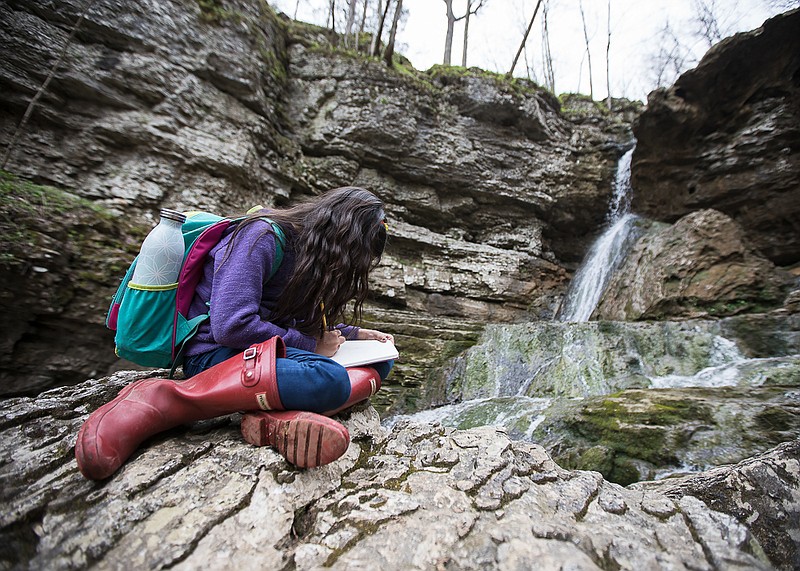In states across the U.S., homeschooling has grown in popularity amid the coronavirus pandemic. Although Chattanooga and surrounding areas already had a robust homeschooling population, there has been a spike in interest since the pandemic took hold last March.
Origins
Joyce McPherson has 30 years of homeschooling experience and founded local mentoring organization Homeschool Inspire. Created last fall, Homeschool Inspire connects mentors with parents new to homeschooling and is funded by a grant from the nonprofit VELA education fund.
She said homeschooling was well-established in the Chattanooga area before the pandemic, but once it started there was an increased interest among families who didn't know anyone involved in it. She said parents had concerns over young children learning online early in the pandemic and interest in individualized learning plans for children with disabilities.
"A lot of the people who came to us were thinking that they would try it for a year to see if that could help their children for that maturity level, and I think some plan to go back into public schools once things settle down, but there are also a few people who came to us who had children with special needs and felt like homeschooling was something they've been thinking about for a long time and [the pandemic] gave them that nudge to go ahead and try it," McPherson said. "They were very interested in a centralized or individualized education for their child - and that is one advantage for homeschooling is that it's very student-centered, a child can learn at their pace and you can also implement special techniques to help them learn - so some of our one-on-one mentees that we've worked with have explained that that has really helped a child who has learning differences."
The Chattanooga Southeast Tennessee Home Education Association is an organization that affiliates a lot of homeschoolers, McPherson said. The group, a local chapter of the Tennessee Home Education Association, provides opportunities and activities to students, while Homeschool Inspire is geared toward parents.
"What we're finding is we're mostly reaching out to parents who are new to homeschooling, or are going through a transition, whether they just moved here or they are transitioning students from middle school to high school or from elementary school to middle school," McPherson said. "So they have questions about that next stage, and that tends to be where we are."
The Chattanooga/Southeast Tennessee organization is not an umbrella school itself, but is a "clearinghouse of information" for homeschoolers, said secretary Jeannette Tulis.
The organization's Facebook group has more than doubled since last year from about 1,000 members to 2,400 members, Tulis said. One reason she thinks interest has grown in homeschooling amid the pandemic is because it provides stability.
"I think the Zoom schooling was, from all I've heard, a huge challenge for a lot of parents and a lot of students. Most parents I talked to who started homeschooling, they just felt like the situation in the public schools and even some of the private schools was just so fluid," Tulis said. "They never knew if it's going to be canceled, if they go back to Zoom schooling, they didn't know what the schedule is going to be like, they didn't know what to expect when their child actually was in the school, what were the restrictions that were going to be placed on that, it was just so much uncertainty that they felt like at least, if they homeschooled, it would be something stable for their family."
Adapting amid the pandemic
Joy Cherrick homeschools her six children and started homeschooling about 11 years ago. She and her husband started researching and reading about homeschooling methods when their oldest child was a baby. Her kids are enrolled through an umbrella school, one of the three types of schools Tennessee requires homeschooled children to be enrolled in.
"That resonated with me, the idea that we would really be able to coach our children, we would be able to encourage their gifts and their abilities, and we'd be able to expose them to things that would challenge them and that really I would become a student of my children, and become a coach and a facilitator instead of 'I have all this knowledge and I'm going to impart it on you now,' it's more 'the world is really big and there's a lot to learn, let's go explore,'" Cherrick said.
Anju Wilson started homeschooling her kids amid the pandemic and has attended Homeschool Inspire meetings led by McPherson. Her children previously attended public school and Montessori school; public school did not include enough outside time and focused too much on testing, while virtual Montessori school suffered since it's typically very hands-on, she said.
She researched different homeschooling methods for two months before starting in August, enrolling with an umbrella school and deciding on the literature-based Charlotte Mason approach that incorporates nature studies.
"I think if parents can spend some time figuring out what they want to do and what they want their kids to learn, there's a lot of flexibility because it's kind of like personalized education for your kids and if you spend some time on the front end planning it makes the whole process a lot more smoother," Wilson said.
For Cherrick, her family's homeschooling experience changed amid the pandemic when businesses closed and people were not able to gather as easily. When some support systems and community institutions were no longer available, her family found other ways to continue with activities and learning through family members.
"Because our church has completely dropped any programs for children at all for a full year, we engaged the grandparents, and asked how they would be comfortable being involved," Cherrick said. "So my dad comes over once a week and does some things to help me in the home school, he'll read books to the younger ones and listen to my first grader read some of his phonics books aloud."
Cherrick said her mother does a preschool lesson once a week with her younger children, and her in-laws living in another state do a writing class over Zoom once a week for her older elementary children and read a story to the younger ones.
"That was something that we probably would not have thought of, because maybe the need would have been met by the physical presence of other people locally through the co-ops or through some of these other resources that we were getting," Cherrick said.
Wilson's family is not involved in co-ops now because of COVID-19, but she and her kids meet with a nature study group weekly to go on nature walks and have botany lessons.
"With our nature hikes, I feel like my kids have gotten more socialization and especially socialization with a variety of ages (talking to adults and kids of all ages not just kids of their age)," she said in an email.
Looking ahead
McPherson said there are about 15 people in Homeschool Inspire participating in one-on-one mentoring, with more participating in meetups and Zoom meetings. One of the goals for the organization is to attract more one-on-one mentees.
"Because of the pandemic, it's really been a one-on-one mentoring, and we hope once we get out of the pandemic that we can bring people together, but so far we've been limited to Zoom seminars when we get together, so it's really the parents who are together," McPherson said.
Tulis has been involved in homeschooling since the early 1990s. She said that overall the growth of homeschooling in the Chattanooga area has been steady. She said the homeschool community here is vibrant and that the internet has made it easier for new homeschool families to get started.
"The internet has provided what used to be a face-to-face support group, they provided a lot of online support," Tulis said. "It doesn't matter what curriculum you choose, there's a social network for that curriculum that you can find out how to use it, what are some tips, what are other resources you can add to it."
Wilson said homeschooling is flexible and and her family plans to keep doing it after the pandemic subsides.
"We really enjoy being together as a family, I really enjoy being with the kids and seeing the wonder and seeing their learning," she said. "I actually kind of regret not starting earlier, if I had had actually just done the work and done the research it could have been a little bit more streamlined and I could have started my oldest in the same program my youngest is on right now and started from the beginning."
Contact Anika Chaturvedi at achaturvedi@timesfreepress.com or 423-757-6592.

